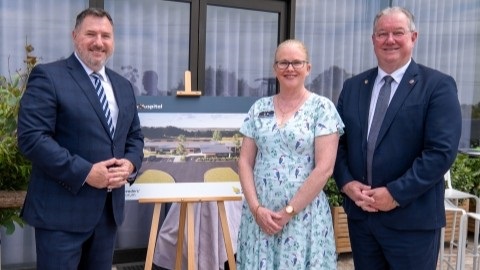Funding locked in for dedicated wildlife hospital
Published 24 October 2025

- A dedicated wildlife hospital will be built at a parcel of Council land at Dakabin, with the State Government announcing it has signed a $15 million funding agreement
- Mayor Peter Flannery welcomed the announcement alongside cute creatures including a koala at the City of Moreton Bay’s Leaders’ Forum 2025 on Friday
- Council has allocated a $3 million parcel of land for the wildlife hospital, which will enable wildlife to be treated locally rather than being driven up to two hours for emergency care at RSPCA in Wacol or Australia Zoo in Beerwah
A dedicated wildlife hospital will be built in the City of Moreton Bay, with $15 million in funding now confirmed for the critical project.
The State Government has announced it has signed the funding agreement for the establishment of the Moreton Bay Wildlife Hospital and Education Hub on a $3 million parcel of Council allocated land at Dakabin.
Minister for the Environment and Tourism Andrew Powell made the announcement at the City of Moreton Bay’s Leaders’ Forum 2025 on Friday, alongside a koala, echidna, squirrel glider and bluetongue skink.
Mayor Peter Flannery welcomed the milestone, a significant step towards the construction of the state-of-the-art facility to be operated by the Moreton Bay Wildlife Hospital Foundation.
“For several years, we have been working with the Moreton Bay Wildlife Hospital Foundation to bring this much-needed facility to life. In 2023, we allocated a $3 million parcel of land in Dakabin for its construction and strongly advocated for the project at our last Leaders’ Forum in 2023,” he said.
“We thank the State Government for agreeing to fund $15 million to get the Moreton Bay Wildlife Hospital off the ground.
“This new facility will deliver world-class care for our local wildlife, including native species such as koalas, sugar gliders, wallabies and kangaroos,” he said.
“It will mean injured wildlife can be treated locally rather than being driven up to two hours for emergency care at RSPCA in Wacol or Australia Zoo in Beerwah, increasing animal survival rates and easing the workload on local carers and rescuers.”
City of Moreton Bay is home to a diverse range of animal species and has one of the largest koala populations in the state.
The wildlife hospital will not only provide a local place for injured wildlife to be cared for, but new opportunities for the community to engage with and learn about local wildlife and assist in their ongoing care, rehabilitation and release.
Minister for the Environment and Tourism Andrew Powell said: “The Crisafulli Government is delivering for Queenslanders big and small with this investment to establish City of Moreton Bay’s first wildlife hospital.
“The Moreton Bay Wildlife Hospital will ease pressure on nearby facilities and veterinarians, helping more animals be rehabilitated and released back into the wild to protect native wildlife for generations to come.
“This investment is part of the Crisafulli Government’s $39.6 million boost for the State’s wildlife hospital networks, which highlights our focus on supporting practical environmentalism across the state.”
Moreton Bay Wildlife Hospital Foundation Director, Christine West said the milestone marks a significant turning point for wildlife care in the City.
“Finalising this grant means we can now get on with the job of building the hospital our community has been working toward for so long,” she said.
“We are grateful for the support of the Queensland Government and City of Moreton Bay in helping us make this vision a reality.”
Council protects local wildlife and conserving the environment through a number of initiatives, including its Land Buyback for Environmental Purposes Program, and is also committed to Going Green as We Grow with a pledge to preserve 75 per cent of the City as rural and natural landscapes for future generations and wildlife to enjoy.